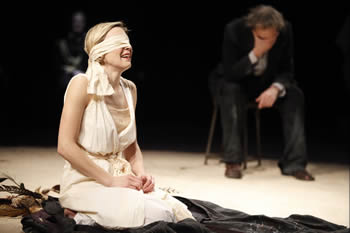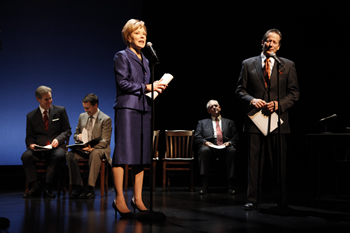HotReview.org Editor's
Picks
Shows Worth Seeing:

The Tempest
By William Shakespeare
The BAM Harvey Theatre
651 Fulton St., Brooklyn
Box office: (718) 636-4100
Sam Mendes’s production of The
Tempest is the clearest, easiest-to-follow Shakespeare production
done to date by The Bridge Project—BAM’s two-year-old
initiative to produce classics in repertory using combined British
and American casts. At its best, it recalls a sleek, elegant,
well-oiled machine, with no gesture or effort wasted and no cog
out of place. Set designer Tom Piper has painstakingly replicated
the gorgeously cracked and pockmarked rear stage wall of the Harvey
Theater in order to insert a noir-ish doorway in it. He has also
flooded the upstage area with thousands of gallons of water, creating
splendid opportunities for fantastical entrances and exits “over
the water,” as it were, forcefully reinforcing the action’s
island locale. The real marvel of the evening, though, is Stephen
Dillane as Prospero, the banished Duke of Milan. Dillane plays
a man so insistently inner-directed that one is constantly reminded
that he lost his throne not just because of his brother’s
perfidy but also because he was too busy reading esoteric books.
Dillane is jittery and brooding by turns, an essentially moral
figure who wants to do right but also deeply dour and reflective,
never quite connecting with others. One has the feeling that he
puts his daughter Miranda magically to sleep not just to carry
out his revenge-plans but because the conversation with her keeps
getting too intimate.
The downstage area is a ring of sand treated
as a magic circle within which anything is possible as long as
Prospero-Dillane wields his staff. Juliet Rylance is a bit too
old to convince as 15-year-old Miranda, but she makes up in earnestness
what she lacks in childishness. Among the other terrific performances
are: Ron Cephas Jones as a marvelously lithe and sensuous Caliban
and Christian Camargo as a fascinatingly workaday Ariel. Camargo
plays not an airy, willowy sprite, as is usual, but rather a plainspoken
boyish fellow in bare feet and a natty blue suit, who seems patiently
nonplussed to have ended up a servant. Though this production
is 145 minutes long with no intermission it mostly rushes along
swiftly and effortlessly. The only exception is when it tries
to rise out of its local human circumstances and wow us with theatrical
effects (metal wings for Ariel, home-movie clips of Miranda’s
childhood during the wedding masque). All those moments jangled
for me, but they were passing blemishes on an exquisite face.
Anyone who has never seen the action of The Tempest grip
an audience should hurry to Brooklyn for this one.
--------------------------------

Top Secret: The Battle
for the Pentagon Papers
By Geoffrey Cowan and Leroy Aarons
New York Theatre Workshop
79 E. 4th St.
Box office: (212) 279-4200
Great documentary dramas grab you by the
collar and stick your nose in what they insist are factual materials,
all the while pumping those materials full of artificial dramatic
energy so that you want your nose to stay there. It’s a
very tricky balancing act that requires just enough factuality
to justify claims to historical truth and just enough artistic
manipulation to keep you interested in those claims for what often
turns out to be a long evening. Another crucial factor is timing:
documentary dramas tend to be perishable, like the news, which
is why so few are revived and fewer still rise to the status of
literature. It’s a remarkable testimony to the strength
and significance of Geoffrey Cowan and Leroy Aarons’ play
Top Secret: The Battle for the Pentagon Papers that it
holds its own on all of these fronts 20 years after it first appeared.
First done as a radio play by L.A. Theatre
Works in 1990 and broadcast on NPR, Top Secret uses interviews,
trial transcripts and other public documents to tell the story
of how and why the Washington Post defied the U.S. government
in 1971 by publishing news stories drawn from the mysteriously
obtained “pentagon papers”—4,000+ pages of secret
documents explaining the origins and conduct of the Vietnam War.
Although there was nothing directly damaging to the Nixon administration
in those documents, it took vigorous legal action to suppress
their publication anyway, claiming a threat to national security,
and that knee-jerk impulse to “overclassify,” to maintain
a default policy of secrecy in government, is the sadly imperishable
focus of this play.
Top Secret is dismayingly timely.
It’s also very powerful, in part because of its theatrical
humility. In adapting the work to the stage, the director John
Rubinstein has wisely and charmingly chosen to retain the basic
conceit of a radio drama, using nothing but a few chairs and tables,
with actors in period costumes stepping up to microphones with
scripts in their hands and a woman at a sound-effects table upstage
adding door-slams, phone-rings and glass-clinks as necessary.
The strength of the show isn’t just in clever technique,
though. Cowan has updated his text with smart and illuminating
material that was unavailable in 1990 (e.g. from the newly disclosed
Nixon tapes), which makes it feel more relevant than ever. The
question of balancing press freedom against national security
that the original play raised has grown, if anything, more pressing
under Bush II and Obama, and the drama approaches it with pointed
clarity and fairness. I suspect that that is its greatest provocation
today, alas, as we have grown so hardened and uncivil in our civil
discourse. Anyone with a fixed position on these matters, from
the right or the left, will likely find something in Top Secret
to enrage him/her, simply because it respects the other side.
